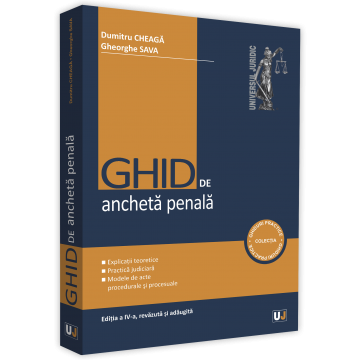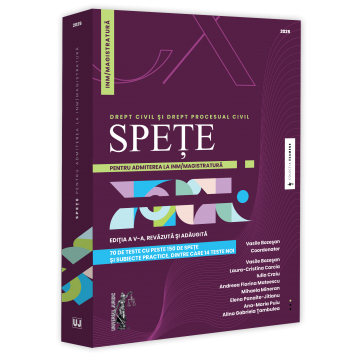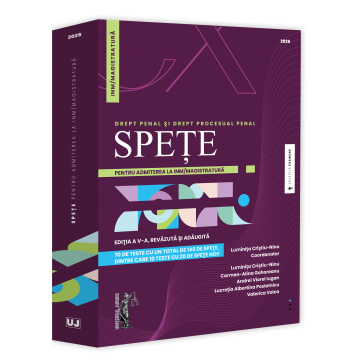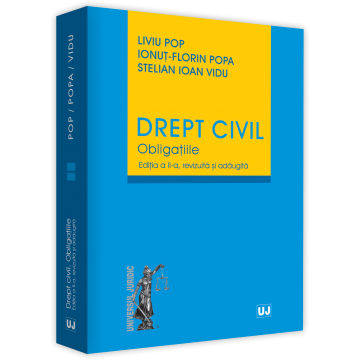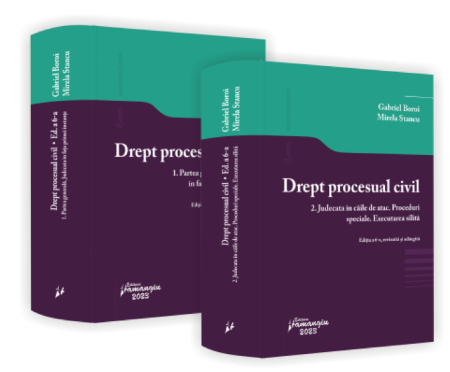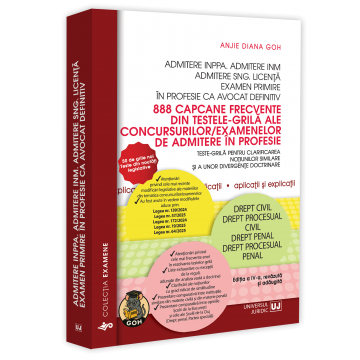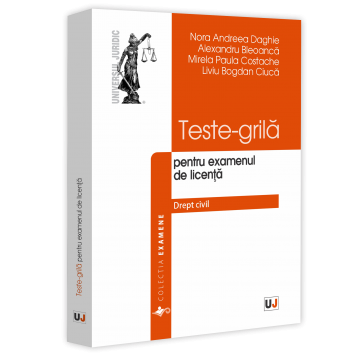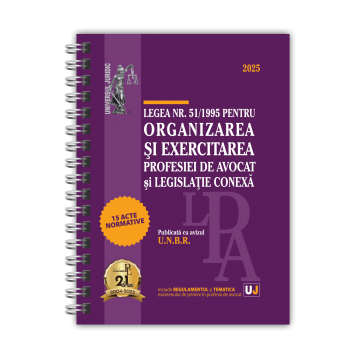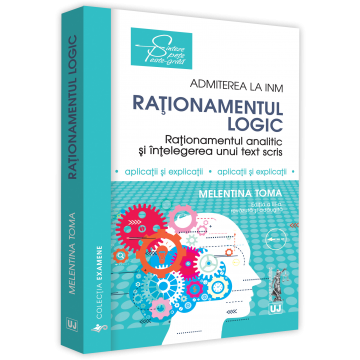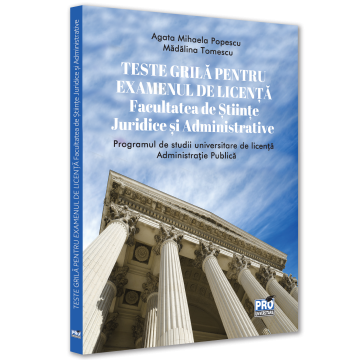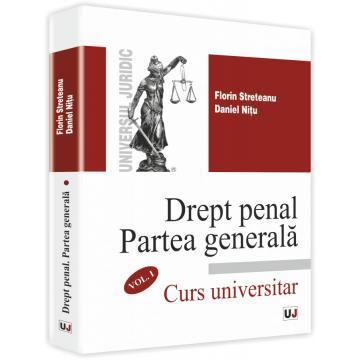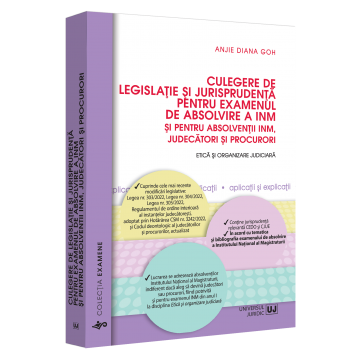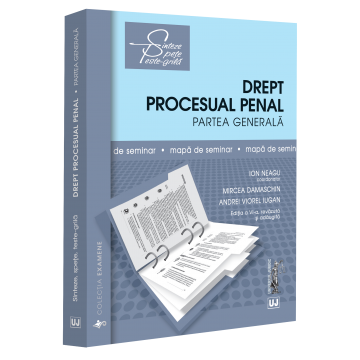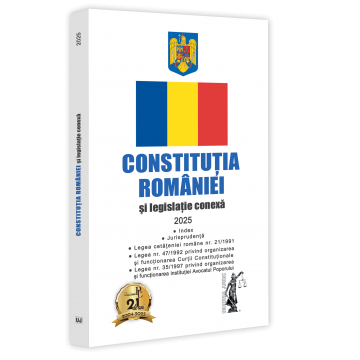ISBN: 978-973-749-959-2
Publisher year: 2010
Edition: I
Pages: 214
Publisher: Editura Universitară
Author: Monica Pocora
- Description
- Download (1)
- Authors
- Content
- More details
- Reviews (0)
The work "Special confiscation" is a particularly valuable research that focuses on a very sensitive issue and has serious implications for the protection of fundamental human rights. It is about the confiscation of property that in one way or another are related to the commission a crime or only a deed provided by the criminal law, as the case may be.
The legal literature shows that criminal norms, like any other category of legal norms, are composed of a precept and a sanction, the precept creating and describing the illicit, and the sanction characterizing this illicit as criminal. For this reason, the criminal sanction is one of the terms of the crime and not an element of it. An inconvenient activity from a social point of view can be declared as an illegal act by any branch of law, but it can only be qualified as a crime insofar as the sanction provided for that fact is a criminal sanction.
In legal language, the word "crime" is reserved for the field of criminal law, just as the term "punishment" is reserved for criminal law sanctions. In this way, stricto sensu, by criminal sanction is meant punishment. In an extended perception of the sanction as a consequence of the violation of the law, criminal sanctions or, more precisely, sanctions of criminal law are both punishments (as repressive measures) and security measures (as preventive measures).
In any case, however, both punishments and security measures are the legal consequence of the crime because they have their primary cause in it.
In fact, the problem of identifying the most effective social reaction to committing an antisocial act of high gravity has always been a problem that has provoked and still provokes heated discussions. In arguing this statement that we have just made, we bring elements that are related to the concept of "alternative sanctions" increasingly agreed in the present and that tend to solve a paradox facing the field of interest - that of ensures the resocialization of those who commit acts of high gravity through measures to isolate them from the social environment.
The punishment itself, as a criminal sanction, had to go through a whole history in order to establish what functions it has, without being able to state that there is a full consensus about it. In the literature it is considered that the functions and immediate purposes of punishment are:
The function of coercion or repression. This is because, being a measure of state coercion, the punishment is inconceivable without causing a certain suffering, without imposing a deprivation or restriction on the convict and without the disapproval that accompanies it. For this reason, the punishment is a sanctioning equivalent of the degree of social danger presented by the committed deed and its perpetrator and therefore is always a repressive measure, without this character being the essence of the punishment. The repressive character of the punishment increases or decreases depending on the gravity of the crime committed.
The re-education function is the one that allows the constraint function to be completed for the purpose of re-education. Repression as a single objective cannot ensure the achievement of the rule of law, even art. 52 para. 2 C. pen. in force, prohibiting the physical suffering and humiliation of the convict. Punishment does not achieve revenge, but must aim at re-educating and correcting the convict, or this purpose can not be achieved when the person is humiliated and tortured.
The exemplary function as an adjacent function is the one that consists in the influence that the punishment applied to the convict exerts on other persons. It is a function of intimidating those members of society who would be tempted to commit antisocial behaviors, and in order for efficiency to be maximum, it is mandatory that the application be made promptly.
The elimination function is also an adjacent function, which consists in the temporary or definitive elimination of the convict from society. Temporary elimination is carried out whenever the prison sentence is executed in places of detention, which appears necessary in the case of crimes with a high degree of social danger. Definitive removal of the convict from society is possible only in cases strictly provided by law, when the offender is sentenced to life imprisonment.
Thus outlined, the punishment as a criminal sanction was sometimes found in the situation of being inefficient and not being able to exercise their functions in particular cases in which the persons who committed the deeds were among those who did not meet the general conditions of responsibility in this field. It is, for example, the case of the mentally insane or of the minor who is not criminally liable and who cannot bear the criminal sanction because its only basis is missing - the crime. That's exactly why we felt it The need to create another type of sanctions, criminal law sanctions this time, to complete the functions of punishment.
In this way, the safety measures appeared as means of coercion with a purely preventive character, destined to remove a state of danger and to prevent the commission of the deeds provided by the criminal law. These "states of danger", distinct from the social danger posed by the crime, are specifically provided by criminal law and generally concern the person of the perpetrator. As shown in the doctrine, through their content and legal nature, security measures appear as a new type of criminal law sanction, intended to replace or supplement the punishment in the fight against crime; that is why the institution of security measures is known today in practically all contemporary criminal legislations
.
These being the elements from which we start in our research, we consider it of special importance the monographic study of special confiscation as a security measure with multiple features, including within the legal category to which it belongs, and which has multiple reflections in legal instruments developed and adopted at different levels and under the auspices of international organizations. We will pay special attention to the way in which this reflection is done concretely, with the research of the legal instruments of special relevance in the matter, but also to the analysis of the regulations of the special confiscation from different countries of the world.
We appreciate that these elements are very important at present, when the Romanian criminal legislation is in an accentuated process of reform and resettlement, especially on the line of alignment with the European exigencies in the matter.
-
Special confiscation
Download
List of abbreviations / 5
Introduction / 11
Foreword / 15
Chapter I
Security measures in the system of criminal law sanctions
Section 1
Criminal law sanctions / 19
Section 2
Security measures - criminal law sanctions / 25
Section 3
Safety measures - regulatory framework and characterization / 28
Section 4
Historical references on safety measures / 35
Section 5
Elements of comparative law on security measures / 46
Subsection I.5.1.
Special confiscation in French criminal law / 47
Subsection I.5.2.
Special confiscation in Belgian criminal law / 51
Subsection I.5.3.
Special confiscation in Italian criminal law / 55
Subsection I.5.4.
Special confiscation in Swedish criminal law / 57
Subsection I.5.5.
Special confiscation in German criminal law / 59
Subsection I.5.6.
Special confiscation in Spanish criminal law / 61
Subsection I.5.7.
Special confiscation in South African criminal law / 62
Subsection I.5.8.
Special confiscation in Australian criminal law / 65
Subsection I.5.9.
Special confiscation in Russian criminal law / 68
Subsection I.5.10.
Special confiscation in British criminal law / 70
Subsection I.5.11.
Special confiscation in Dutch criminal law / 71
Subsection I.5.12.
Special confiscation in Danish criminal law / 73
Subsection I.5.13.
Special confiscation in Irish criminal law / 74
Chapter II
Special confiscation - security measure
Section 1
Special confiscation - regulation and legal nature / 75
Section 2
Constitutionality of the regulations of art. 118 C. pen. regarding special confiscation / 86
Section 3
General conditions of special confiscation / 88
Section 4
Special confiscation reflected in international legal instruments / 94
Chapter III
Categories of goods that may be subject to special confiscation
Section 1
General considerations / 117
Section 2
Categories of goods that can be concretely subject to special confiscation / 120
Subsection III.2.1.
The goods produced by the deed provided by the criminal law / 121
Subsection III.2.2.
Things that have been used, in any way, to commit a crime / 125
Subsection III.2.3.
Goods produced, modified or adapted for the purpose of committing a crime / 140
Subsection III.2.4.
The goods that were given to determine the commission of an act or to reward the perpetrator / 142
Subsection III.2.5.
The goods acquired by committing the deed provided by the criminal law / 150
Subsection III.2.6.
Assets whose possession is prohibited by law / 160
Chapter IV
Other issues related to the security measure of special confiscation
Section 1
Special confiscation based on texts provided in the Special Part of the Criminal Code or in special laws / 167
Subsection IV.1.1.
Special confiscation in the field of corruption crimes / 167
Subsection IV.1.2.
Special confiscation in the field of money laundering / 169
Subsection IV.1.3.
Special confiscation in the customs field / 172
Subsection IV.1.4.
Special confiscation in the field of hunting and protection of the hunting fund / 175
Subsection IV.1.5.
Special confiscation in the forestry field / 176
Subsection IV.1.6.
Confiscation / special / in / the / field / of fishing / and fish farming / 178
Subsection IV.1.7.
Special confiscation in case of illicit drug trafficking / 180
Subsection IV.1.8.
Special confiscation in the field of trafficking in human beings / 183
Section 2
Delimitations in the field of special confiscation / 185
Subsection IV.2.1.
Special confiscation and other security measures / 185
Subsection IV.2.2.
Special confiscation and confiscation of property / 186
Subsection IV.2.3.
Special confiscation and contraventional confiscation / 189
Subsection IV.2.4.
Special confiscation and additional penalties / 192
Section 3
Criminal procedural aspects / 193
Subsection IV.3.1.
Taking the security measure of special confiscation / 193
Subsection IV.3.2.
Implementation of the special confiscation security measure / 196
Section 4
Special confiscation in Law no. 286/2009, The New Criminal Code of Romania / 196
Conclusions and proposals / 203
General bibliography / 207
Regarding the work "Special confiscation", elaborated by Monica Pocora, it can be appreciated that it represents a very valuable research that has in the center of attention a very sensitive issue and that has serious implications on the field of protection of fundamental human rights. It is about the confiscation of the goods that, in one way or another are related to the commission of a crime or only of a deed provided by the criminal law, as the case may be.
We notice from the beginning that the approach that the author chose is a very topical one, because taking such measures to prevent the repetition of criminal behavior is recommended by many international legal instruments to which Romania is a party. Moreover, these regulations are presented in detail in the paper, a special emphasis being observed, as is natural in terms of reflecting the measure in European Union law. In this way, the monographic research proposed by the author acquires an added value, offering the fundamental landmarks of the topic she approaches.
In order to give balance to the work, we proceed to a necessary introduction to the topic by presenting some very important concepts for understanding the general context of security measures, among which our Criminal Code in force since 1969 includes special confiscation. Among the concepts defined and recognized to have special relevance are those of criminal sanction and sanction of criminal law. Equally, a brief look is made at the evolutionary process of the institution of safety measures in terms of their reflection in modern legislation in Europe and in our country. Such an incursion is likely to facilitate the understanding of the general regulatory framework, but also of the mechanisms and principles that are verified in the field of interest.
We especially notice the section reserved for the elements of comparative law, because it adds value to this paper. It is interesting that the author brought to attention elements reflected in the legislation of some states that frequently appear in works of this level, but also elements of the Australian legislation in which she particularly emphasizes the way in which confiscation is regulated as a civil procedure.
In addition to the research carried out, the discourse on special confiscation is customized - as a safety measure. We also make a special remark in connection with the section reserved for the investigation of the constitutionality of the provisions regarding the regulation of special confiscation in the Criminal Code in force. Within it, the question of positioning the criminal disposition in contradiction with the Fundamental Law is clarified, the answer being a negative one. It is important to note that the author even proposes to amend the Constitution, in order to ensure the full effectiveness of the provision in the Criminal Code regarding the security measure of special confiscation.
In a separate chapter in the paper, we proceed to the monographic research of the categories of goods that may be subject to special confiscation in accordance with the Criminal Code in force in 1969. We note on this occasion that the author has shown a special analytical and synthetic that he proposed a rigorous and balanced systematization of theoretical and judicial practice issues. Moreover, the way in which he analyzed these issues demonstrates the fact that, based on a rigorous documentation, a good and correct knowledge of the researched field could be achieved. We say this because in the sections of this chapter can be found the most controversial issues that each category causes. Moreover, the author also expresses pertinent points of view regarding some of the controversial elements, which she supports with arguments of recent judicial practice. This circumstance anchors in a deep way the work in the objective realities, giving it the characteristic of actuality.
In her work, the author chose to include some scores that do nothing but complete the analysis carried out so far. In particular, we emphasize the way in which the regulatory framework is reflected in the thesis regarding the special confiscation established by norms found in the special legislation. Norms with this specific are brought to attention, which are established in areas such as: human trafficking, corruption, forestry, protection of the hunting and fishing fund, etc. Also, we find interesting the way in which the author analyzes comparatively the current regulation in the field of special confiscation and the one in Law no. 286/2009 which will become the New Criminal Code of Romania.
At the end of the thesis, the author also formulated some proposals for the law ferenda which demonstrate that the field to be investigated is very it's well known. For example, taking advantage of the overview created by the research, the author proposes that every time a normative act contains provisions regarding confiscation, to specify the legal nature of the measure it establishes. This is because otherwise, the risk of confusion is significant, the example targeting the provisions of the O.U.G. no. 23/2008.
From the previous observations it is clear that this paper is a valuable monograph that completes the Romanian doctrinal landscape and benefits from a coherent and balanced structured discourse, an elaborate style and a rigorous documentation, underlined and the bibliographic list that accompanies it.

6359.png)
![Special confiscation - Monica Pocora [1] Special confiscation - Monica Pocora [1]](https://gomagcdn.ro/domains/editurauniversitara.ro/files/product/large/confiscarea-special-2233-914804.jpg)
